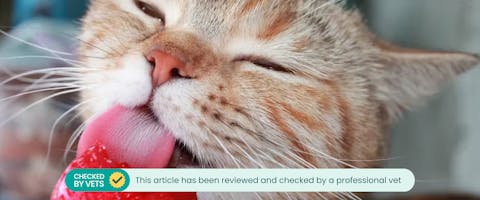Updated 12/05/2023
Berries are jam-packed with antioxidants and vitamins that are great for us humans, but can cats have berries? Or are they just as toxic as tomatoes, cherries and onions? Let’s find out.
Trending posts
Purr-use some of the top blogs our members have been loving this month- Top male dog names for your new furry friendGot a new furry family member in your pack? Check…

- Top female dog names for your new fluffy palWelcoming a new pooch into your family? Explore…

- 250+ gray cat names your silver feline will loveRecently welcomed a fluffy gray bundle of joy into…

- What are normal pet sitting rates?Discover the average pet sitting rates for animals…

- Unique dog names to stand out from the packDare to be different with our list of the best…

Can cats eat berries?
Fortunately, it’s a yes to this one - berries are perfectly safe for our feline friends. In fact, they’re packed full of nutrients that help to make up a seriously health-conscious snack (that your kitty will be equally seriously grateful for). Fruits like blueberries, raspberries, blackberries and cranberries are all perfectly safe for your cat to chow down on. They’re high in all the good stuff like antioxidants, flavonoids and fiber, plus vitamins A, C, K and E. Our feline friends can also safely eat strawberries in small amounts - they contain lots of antioxidants and fiber along with folate, potassium and manganese, as well as vitamin C. The bottom line? Whichever berries you choose to share with your kitty, just make sure they’re cut into small, bitesize pieces that are just right for your cat, and be sure to serve them plain.
Are berries bad for cats?
So now we know the health benefits of some of the most widely available berries, are there any that are bad for cats? So while technically cherries aren’t considered berries, lots of people mistakenly think they are, so we felt it was worth a mention here! Steer clear of cherries - when unripe, the flesh is toxic to cats, as well as the rest of the plant. And of course, it goes without saying that it’s important to be feeding your feline friend a balanced cat food that’s right for their age and breed - no feline diet should be predominantly made of berries, no matter how much nutrients they contain. Cats are obligate carnivores which means they need meat to survive. They need a predominantly meat-based diet. Their digestive systems are primed to digest meat and they are less efficient at digesting berries and other fruits.
Feeding your cat berries
Our feline friends are well-adapted for chowing down on soft food (like the commercially available cat food on the market), or small biscuits that are just the right size for their tiny mouths. So, if you’re thinking about treating your kitty with a berry or two, be sure to cut them into small, bitesize pieces to curb the choking hazards posed by small pieces of food and an eager-to-munch feline! Blueberries also contain a lot of sugar, and can cause your cat’s blood sugar to spike quickly. If cats repeatedly consume too much sugar this leads to issues with their digestive tract, unnecessary weight gain and can cause conditions such as diabetes to develop.
Meet our veterinary expert, Emma
This article has been checked by veterinarian Emma Chandley, BVetMed MRCVS PGCertSAS. Emma graduated from the Royal Vet College in London in 2011. She has a keen interest in surgery and went on to do a postgraduate certificate in small animal surgery and was then awarded advanced practitioner status in the same discipline.
Other foods that are safe for cats
Some of the food us humans love is in fact safe for cats, but it shouldn’t make up a huge part of their diet. Your best bet for making sure your kitty is getting all the nutrients they need is to invest in a commercially available cat food that’s just right for their age, breed and health needs. And for between-meal treats, be sure to get clued-up on what cats can and can’t eat. To start you off, here’s a few items that are safe for our feline friends…

